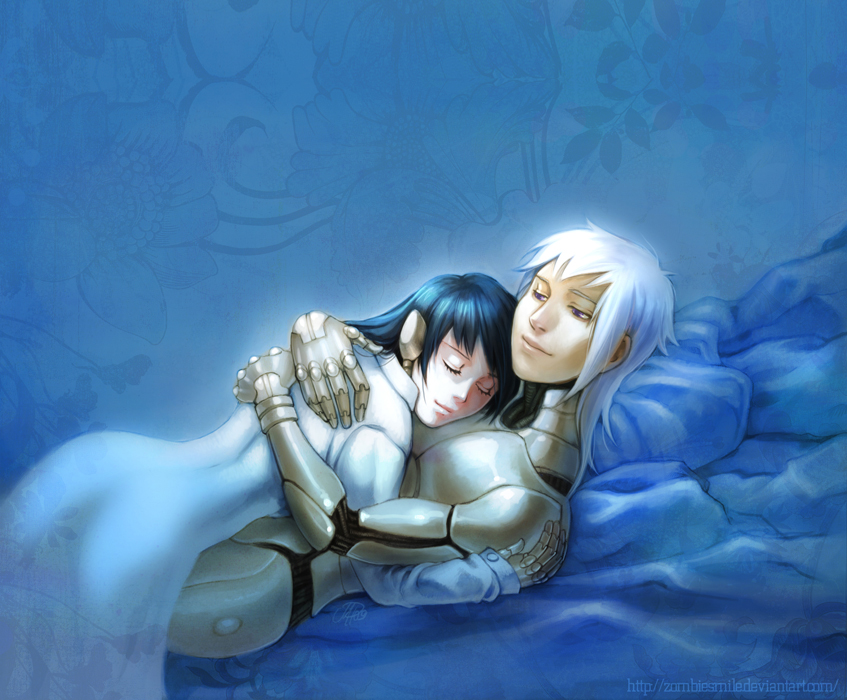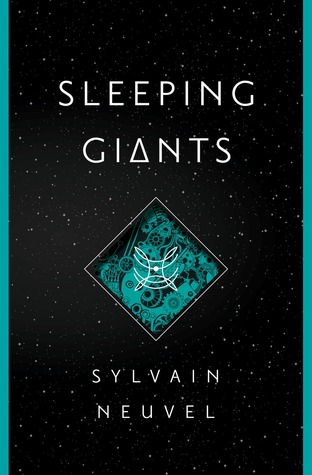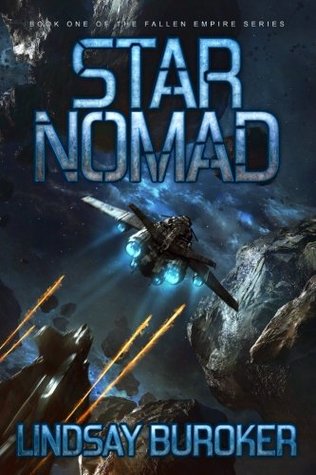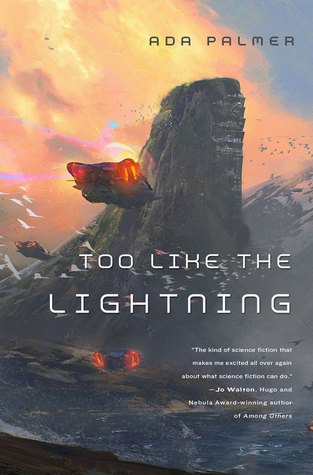
I never thought about things like bridal showers, mainly because I was too caught up in a good book and I missed out on that whole plan your wedding phase that is supposed to happen. Who ever came up with the idea that girls just sit around planning their weddings when they are growing up is full of sh*t because none of my friends ever once brought up the topic. And, unless we were some sort of anomaly (which I doubt), it can only be a fabrication perpetuated by the media.
Otherwise, it was from a generation, but not mine.
In either case, it was just not something that I was thinking about when reading the likes of Asimov, Atwood, or Le Guin.
Had you suggested it to me, I would have thought you were mad.
And that is why I am at the point where I am now.
Because, well, I still think people that suggest things like that are mad.
The Big Deal, To Me
When I was growing up my parent's encouraged me to be in-depended, to be self-reliant, and to not get caught up in what society things I should be doing.
In other words they raised a young feminist. And I couldn't be happier that they gave me that chance.
It was because of this that I was able to find a partner that really fits with who I am, and I would like to think that I fit just as well with him. But while he is more progressive that most men I have met, his mother is another story. She was brought up very traditionally. And while I can't blame her for that. She wants to make a big deal out of you impending wedding, and that includes throwing me a bridal shower. Something that I have a problem with. Though I am not the only one that thinks they have sexist vibe. And are more problematic, something that has traditionally been there to perpetuate those gender roles that, at my core, I am very much against.
It isn't that I can't appreciate the thought, she is going to be spending her time and money to host a party in my honor. And it will be a great opportunity to get to meet his side of the family. At least the female side. Since a co-ed shower, that is one that honors both the bride and the groom, is a null topic for her. Which is a pity, since that is one of the few things that I could actually see myself getting behind and even enjoying.
Which leaves me with a few details that I need to work out for myself.
One of them is to see how much bridal is, too much.
Find A Compromise
Since I actually like my future mother-in-law I would most pleased if we could find a compromise that we are both happy with. I plan to avoid drama at all costs over the course of the wedding. It is actually a little pact that my fiancee and I made with one another.
Keeping the peace is an important first step.
She emailed me a sample of invitations that she wanted to pick from. And while they could all be described as tastefully gendered though I will be honest, it could be worse. Most of the designs that she choose a number of common styles that would be seen by most as standard shower fare. And there is nothing in itself wrong with that.
Like with everything else, there is something for everyone and shower invites are definitely no exception, you just have to know what you want. Well I can't say that I know what I want. But I can say that none of the invitations that she chose were my taste.
I would choose something simple, yet fun.
This has all lead me to the very unique situation that I am now in. And it has left me short of ideas. Right now I am mulling over a couple of different options. But here are my top three.
- Alternative ways to do a "bridal shower"
- There are ways to do this. Ways that I might consider, but at the same time, they might either:
- Feel silly, as in just calling it something different, which would be changing the name but not the intent.
- Feel like I am trying to evade the celebration (really, I'm not) in my honor, though the thought behind the celebration is not what bothers me obviously.
- Or make it feel like the hostess is getting slighted. And this seriously is the problem that I have right now. Since I don't want to put my future mother-in-law out. Honestly, there isn't a lot of room here since she is really dead set on hosting some sort of party.
- Be honest, and just skip the bridal shower hubbub.
- I think that one of the best ways of avoiding hurt feelings (in most cases) is to be honest. In this case, I can't say that I wasn't dishonest. I never gave a lot of encouragement, and voice my opinion a number of times, stating that I was not comfortable with the idea. Alright, so that seemed to fall on deaf ears and I will most likely be "give" a bridal shower unless I would really put my foot down, which seems a bit harsh.
- Accept defeat and go ahead with the show, that is go all in for the bridal shower.
- This is probably what most people would do. And in all honesty, it seems to me like the best means to maintain the peace. And I will probably go this route in the end.
Look on the Bright Side Life

So, if I accept defeat, which I do very seldom, I might as well enjoy myself. Or at the very least try to. Or, and this is an all else fails sort of situation, pretend like I enjoyed myself.
In general there will be plenty of opportunities to enjoy myself. And in the event that I am not, the celebration is only supposed to last four hours. It is scheduled to start at 11AM and go until 3PM, with a light lunch (read finger food and tiny sandwiches) in the middle.
There will be a couple of games, which I still need to sign off on. And some other odds and ends that I "will just have to be surprised" with when they are unveiled. I am not expecting to be that surprised since my fiancee has already tipped me off on what they will be (most likely).
The Act of Hosting a Bridal Shower
One thing that I have always though, at least in part, about this type of thing is that it is all a bit of a show. Especially a lot of the ones I have been too in the last couple of years. Each one has to be bigger than the other. And if the women know one another they have to be categorically different from one another, else you run the risk of "copying." And that must be a major no-no. Even though most of them have copied what they found in magazines, or online.
But that is a topic for another post.
My future mother-in-law surely has her reasons for making such an effort to "make it a success," but when you start using expressions like that, I am sort of left scratching my head. Mainly, because I really do not know how that is possible. Maybe if the bride gets lots of gifts. But then how do you weigh that, by the price of the gifts, their size, or what?
It also seems like an odd place to have to win. But then there is always somebody that is trying to make everything into a competition, though I don't know who my MIL would be competing with. Maybe an acquaintance.
Who knows.
In the end, all I want is my SO and a happily everafter.
I think that it is safe to say that a lot of fiction is for the most part easy to categorize. And while we are seeing a lot of work lately that you could say, crosses over, and I'm not sure that we would really want to label it "speculative."
For one thing, I think that the term only fits when the author begins the work with that in mind, and only when they are actually speculating in the strictest sense of the word.
As other people have said in the past, and better than myself I should add, it seems to me that trying to define a genre by grouping things together serves only the marketing department at the different publishers. As a reader I don't look for books based on what I think the publisher's marketing thinks the book is. They use it as a tool and more and more like a crutch. Since they have few other options to get their products - and that is exactly what they see the books as - in front of their readers. You can argue about this as much as you like but in the end, the reader is the one that will see in it what they want.
So what is speculative sci-fi? Or even speculative fiction, if only a genre?

Speculative Fiction
For me speculative fiction, and this can be sci-fi but it does not need to be, simply deals with works that ask the question: "What if?"
These are works of fiction that may use another world to hold a mirror up to our own. Almost all speculative fiction could also be described as SF, fantasy, alternate history, etc, but much less SF, fantasy and alternate history could be described as speculative fiction, although there's still a massive overlap. I don't think it's really a hard division either, you could say that it is a little bit like a sliding scale, many authors choose to work in multiple genres and, while they may be lumped together with the other speculative authors they are not in fact always in that category. I would say that this is even true about specific books, for many of them you could argue either way.
I think that this is as good of time as any to mention Terry Pratchett, the beloved author of the Discworld books and many more.
.jpg)
Many consider "Thud!" a work of speculative fiction, more so even that some of his early works like "The Colour of Magic", and I full see where they are coming from. Both books move in very much a manner that is akin to speculative fiction, though neither book has ever been placed under that category.
This isn't a random mistake by the publishers, they knew their audience, and they knew what they wanted. As with any genre, it is simply a category, there are many exceptions as there are adherents to the rule and Terry Pratchett was the brand, so it is no wonder that they left things alone. The publisher didn't need to go looking for potential readers.
I find the whole notion of genre fascinating, mostly because I think that it is a never ending conversation instead of a definitive system of classification, genres are always in flux.
Authors who might typically be labeled genre fiction authors, Atwood comes to mind, have in recent years stepped our of the confines of their own genre and have become more and more highly respected, I think the debate will only get more complex and we will be rewarded as readers with some of the best works.
Genre As A Tool
Genres are largely tools for publishers. And since we have hinted about this in the previous paragraphs I wanted to go into it a little further and maybe shed some more light on how the industry works.
It is obvious that genres are way to categorize works for the book industry and to sell books targeted at a specific, or perceived audience. This also works to categorize potential readers and supply them with authors and books they may or may not be interested in. It strike me as a little odd, and limiting as a reader, but then it seems to work well enough, and I know plenty of people that are very attached to their genre.
But this leaves you with situations where many readers "won't read fantasy" or "only read fantasy," which is why genres are important for the publishers. Though they are limiting and damaging for authors who don't fit nicely into the different boxes.
How does this work? It is easy, your books get sorted into genres based on the preconceived audience that is being targeted. It is more an emotion or superficial look at the work. The categories themselves are inherently blurry and the reason a book gets labeled sci-fi or fantasy, for instance, is nothing more than because it was in fact labeled that way. It is scary to think that a lot of readers are missing perfectly good opportunities to expand their library just because somebody at Random House or any of the other big publishers decided because a book talks about computers/space/alien life in one chapter that it is inherently sci-fi.
Of course the use of genre labels is used outside the organization of bookstores, and many of the different entertainment branches use them. But they use them differently. What I mean is there are no standard definitions of what a genre is and is not.
While it can be a rewarding piece for discussion, understanding the different ways books are and are not related, it is one that is as influenced by publisher bias as it is reader bias. No matter what, people are going to talk past each other in defining their own genres.
Trust me, it happens every time.
If you ever intend in engaging in such a debate, remember how important it is to identify what it is that you are trying to accomplish with the label.

I love speculative sci-fi for so many reasons. My I would highly recommend "Children of Time," and I would do so due to the human aspect of the story.
Not, because the human characters are likable, in fact they are a bit more annoying than anything else and I felt like it was a challenge at times to get through their chapters, even with that, or especially because of that, the book is a pleasure to read. And there is so much going on in the alternate chapters that the book feel very gratifying to read.
At least for me.
Speculative Science Fiction
Speculative and hard science fiction were part of my childhood, and they are still a part of my life to this day. But it isn't for everyone. Still, if you want to give it a try, I have some suggestions for some good hard science fiction.
One that has always appealed to me is "Teranesia" by Gren Egan since its release in 1999.
The thing that appeals to me is the setting and scope. It is set in a modern day and near future story set on Earth. The story focuses on a couple of scientists and their children, who move to a small island where they study a species of butterflies and their evolution.
Although it's hard science fiction, I should warn you that, when compared to other books by Egan, this one is pretty much character driven throughout.
Then there is Dougal Dixon. What can I say? I love Dougal Dixons work!
His books remind me of Olaf Stapledons novels. And if you know Stapledon you will see what I mean, specifically "Last and First Men" and "Star Maker", both of which were written in the 1930's; I'm sure they must have been an inspiration for Dixon.
Speaking of Stapledon, it may interest you to learn that if you live in a country with a lifetime 50 years copyright law his books are now in the public domain and you can get them from Gutenberg.
Vernor Vinge's "Marooned in Realtime" has some of this same sort of charm. Though I think that it takes you a bit to move into the story since it involves "bobbles" which let people jump years or millennia ahead in the future. The main characters are all far enough in the future that there are many different animals which have evolved throughout their journey. It's not a huge part of the story, granted, but it's quite evocative nonetheless.
The Time Ships
Baxter's "The Time Ships" is a mind-bending and very well written book. The book deals with different evolutionary paths of human beings in the far future.
It's an official "sequel" to H. G. Wells' "Time Machine," endorsed by the H. G. Wells foundation. I will say though that you don't have to know anything about Wells "Time Machine" to enjoy Baxter.
One thing that I love about Baxter's work is that he really enjoys exploring human specification; no matter which book you pick up you will find it, with most of the Xeeleeverse books going as far as they can to see how flexible the concept of "human" really is. They are fascinating and definitely worth exploring. His Coalescences are if nothing else neat, offering a sort of twitchy kind of fun.
He wrote another book some time ago which was simply titled: "Evolution." It was essentially a novelization of primate evolution on Earth, the book was a collection of short stories, each one from the perspective of various creatures, hominids, and posthumans.
While I love Baxter's work I will be the first to tell you that "Evolution" is not his best work. I think that the main complaint that I have with the book is that it feels a bit self-indulgent, at least when compared to his usual style - but it is still an interesting novel worth reading.
Which brings us to . . .
Other Titles
- The Long Earth this is a collaboration between Baxter and Terry Pratchett
- Children of the Comet Don't by Donald Moffitt
- Five Thrillers by Robert Reed?
- Dark Eden by Chris Beckett
The list is so long though that it is really hard to ever say that it is complete.



.jpg)

 Paper Girls, Vol. 1by Brian K. Vaughan
Paper Girls, Vol. 1by Brian K. Vaughan The Long Cosmosby Terry Pratchett, Stephen Baxter
The Long Cosmosby Terry Pratchett, Stephen Baxter Sleeping Giantsby Sylvain Neuvel
Sleeping Giantsby Sylvain Neuvel The Buntline Specialby Mike Resnick
The Buntline Specialby Mike Resnick Star Nomadby Lindsay Buroker
Star Nomadby Lindsay Buroker Too Like the Lightningby Ada Palmer
Too Like the Lightningby Ada Palmer